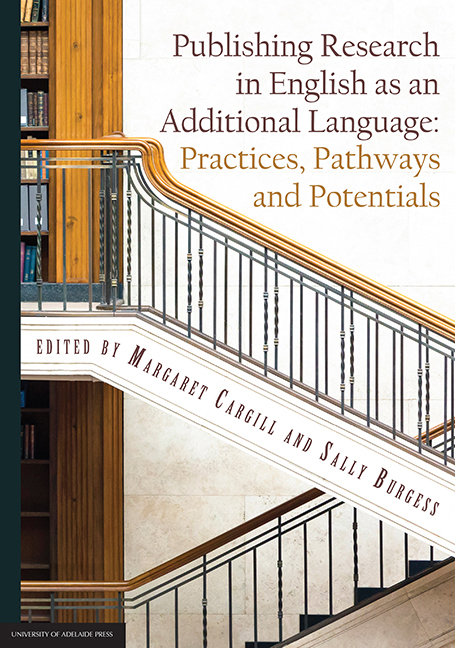Book contents
- Frontmatter
- Contents
- List of contributors
- Acknowledgements
- Foreword
- Introduction: Unpacking English for Research Publication Purposes [ERPP] and the intersecting roles of those who research, teach and edit it
- 1 Accept or contest: A life-history study of humanities scholars’ responses to research publication policies in Spain
- 2 Introducing research rigour in the social sciences: Transcultural strategies for teaching ERPP writing, research design, and resistance to epistemic erasure
- 3 Blurring the boundaries: Academic advising, authors’ editing and translation in a graduate degree program
- 4 The delicate art of commenting: Exploring different approaches to editing and their implications for the author-editor relationship
- 5 The CCC Model (Correspondence, Consistency, Correctness): How effective is it in enabling and assessing change in text-editing knowledge and skills in a blended-learning postgraduate course?
- 6 How credible are open access emerging journals? A situational analysis in the humanities
- 7 Disseminating research internationally: Intra-subdisciplinary rhetorical structure variation in immunity and allergy research articles
- 8 Scientists publishing research in English from Indonesia: Analysing outcomes of a training intervention to inform institutional action
- 9 ‘The one who is out of the ordinary shall win’: Research supervision towards publication in a Chinese hospital
- 10 The geopolitics of academic plagiarism
- 11 Training ‘clerks of the [global] empire’ for 21st-century Asia? English for Research Purposes (ERP) in Vietnam
- 12 Standardisation and its discontents
- Reflections and future directions in publishing research in English as an Additional Language: An afterword
11 - Training ‘clerks of the [global] empire’ for 21st-century Asia? English for Research Purposes (ERP) in Vietnam
Published online by Cambridge University Press: 16 March 2018
- Frontmatter
- Contents
- List of contributors
- Acknowledgements
- Foreword
- Introduction: Unpacking English for Research Publication Purposes [ERPP] and the intersecting roles of those who research, teach and edit it
- 1 Accept or contest: A life-history study of humanities scholars’ responses to research publication policies in Spain
- 2 Introducing research rigour in the social sciences: Transcultural strategies for teaching ERPP writing, research design, and resistance to epistemic erasure
- 3 Blurring the boundaries: Academic advising, authors’ editing and translation in a graduate degree program
- 4 The delicate art of commenting: Exploring different approaches to editing and their implications for the author-editor relationship
- 5 The CCC Model (Correspondence, Consistency, Correctness): How effective is it in enabling and assessing change in text-editing knowledge and skills in a blended-learning postgraduate course?
- 6 How credible are open access emerging journals? A situational analysis in the humanities
- 7 Disseminating research internationally: Intra-subdisciplinary rhetorical structure variation in immunity and allergy research articles
- 8 Scientists publishing research in English from Indonesia: Analysing outcomes of a training intervention to inform institutional action
- 9 ‘The one who is out of the ordinary shall win’: Research supervision towards publication in a Chinese hospital
- 10 The geopolitics of academic plagiarism
- 11 Training ‘clerks of the [global] empire’ for 21st-century Asia? English for Research Purposes (ERP) in Vietnam
- 12 Standardisation and its discontents
- Reflections and future directions in publishing research in English as an Additional Language: An afterword
Summary
Introductory background
Recent global escalation of English language [EL] teaching has led to increasing concern, especially in Asia, about the most appropriate ways to teach English and to conduct and publish anglophone research in Asian contexts. Established Western assumptions about the huge benefits of international research are now spreading globally at an accelerating rate: ‘the research carried out in universities, in industry, in government laboratories, and in independent research organizations touches the lives of almost every one of the world's billions of people’ (Kulakowski & Chronister, 2008, p. 3). As a consequence, government policy reforms in many Asian countries now demand that academics and research students carry out globally acceptable research in order to advance their own country's capacity to access and contribute to international knowledge repertoires.
Development of ELT and research training in Vietnam
This political trend towards the prioritising of research has been notably evident in Vietnam with accelerating emphasis since the innovations of the reform period of the 1990s. During the periods of warfare in Vietnam in the late 1940s and 1950s, Vietnam's education system was influenced by conflicting models, one of which followed the philosophies of other Socialist countries while the other was under the control of the Southern government and reflected Western values when the first prime minister of the south put its education ‘in a faithful translation of the French education program’ (London, 2011, p. 14). After the end of the war, North and South Vietnam reunited and, in 1986, the new government led the nation through a period called Đổi Mới or ‘Renovation’. Nguyen (2014) shows that marked changes in educational priorities started during the Đổi Mới period, in which the Vietnamese Ministry of Education and Training [MOET] actively opened up opportunities for innovation, asking for capital from many sectors, even from foreign countries, and strategically sending educators abroad to learn about international trends in education.
These developments were especially significant in the field of English language teaching [ELT]. Prior to Đổi Mới, French and Russian had been the dominant foreign languages in Vietnam, but as a result of the rapid globalisation of English, English has taken over to become the required and most sought-after language right across primary, secondary and tertiary levels (Tran et al., 2014).
- Type
- Chapter
- Information
- Publishing Research in English as an Additional LanguagePractices, Pathways and Potentials, pp. 221 - 238Publisher: The University of Adelaide PressPrint publication year: 2017

